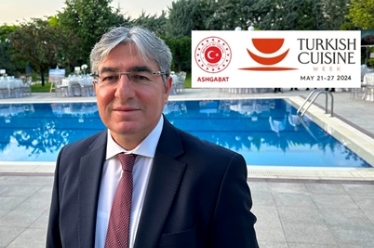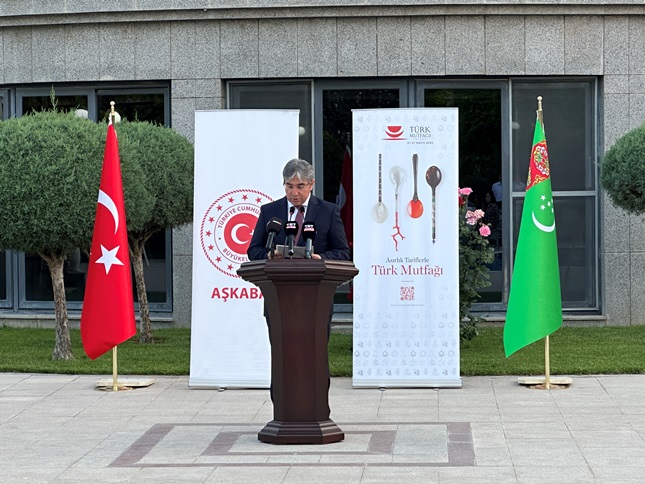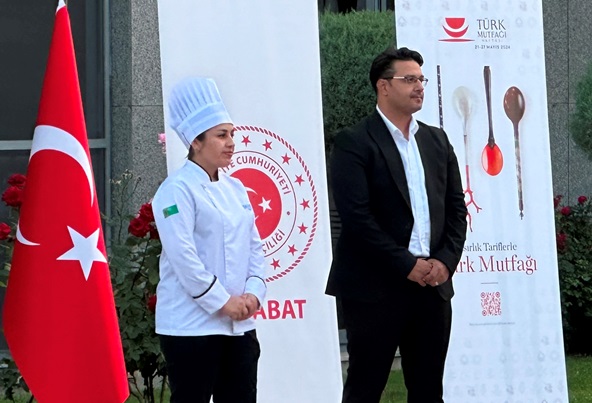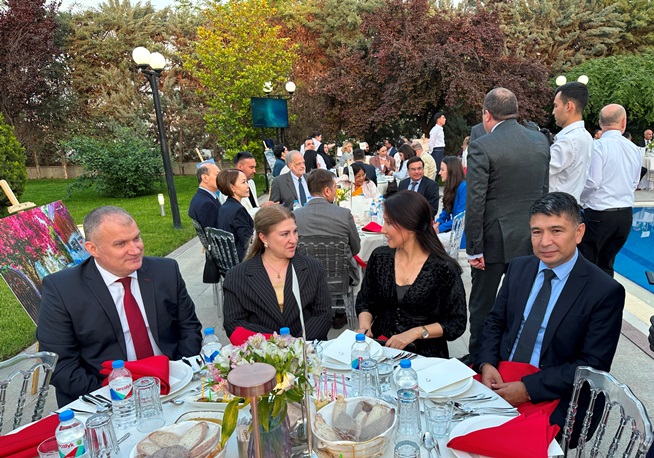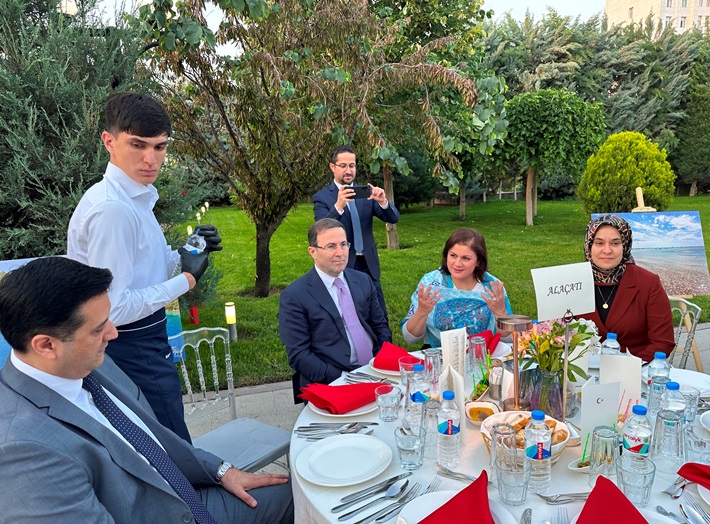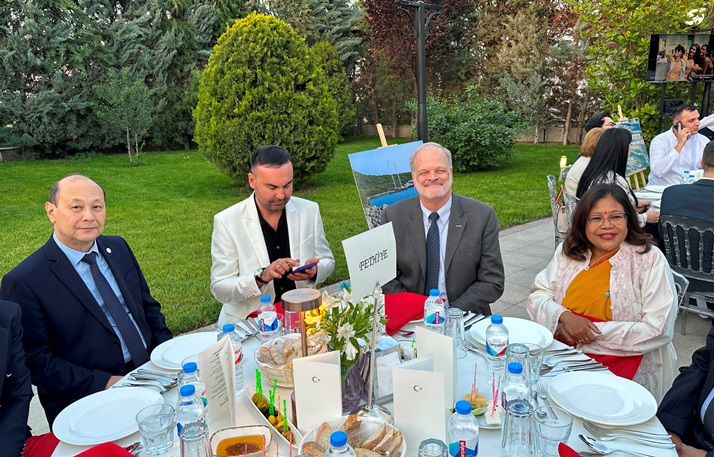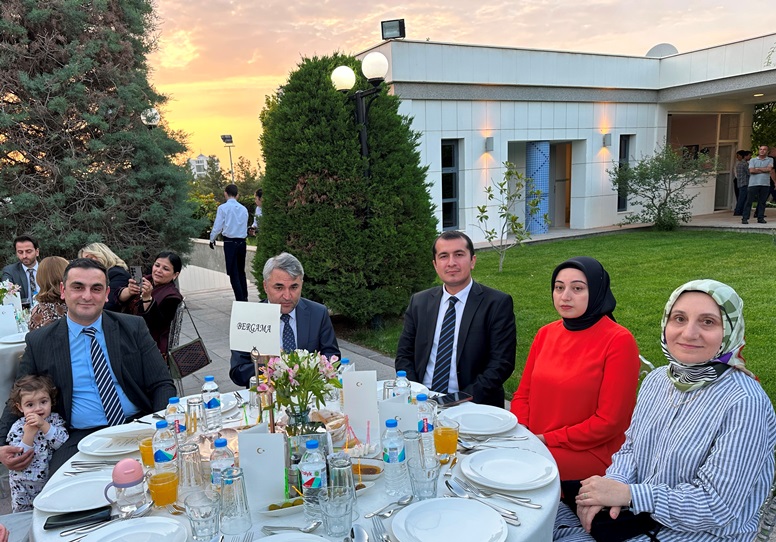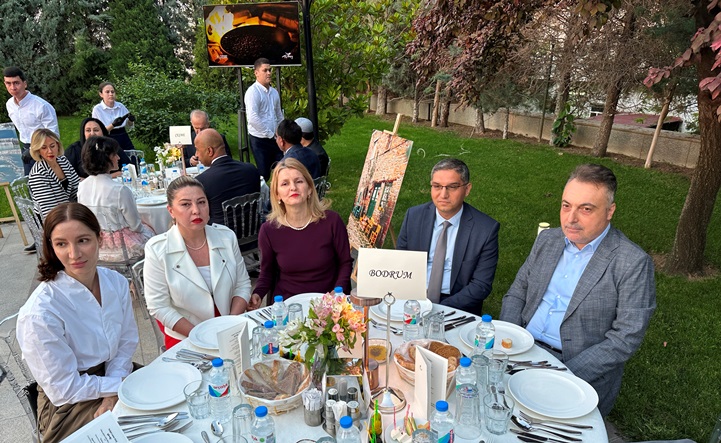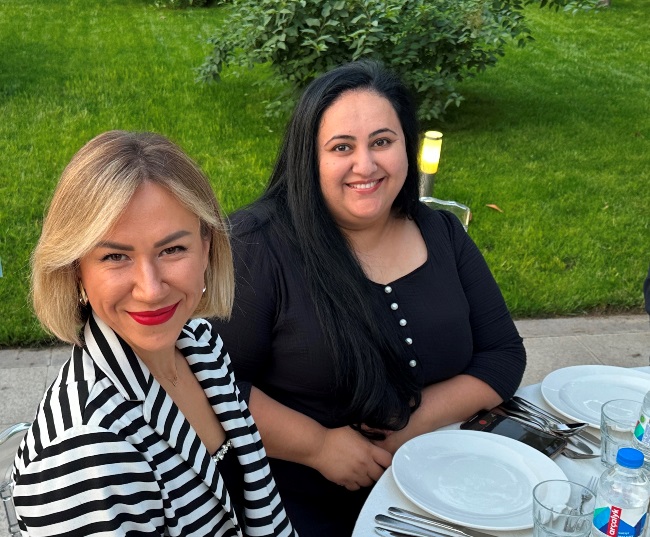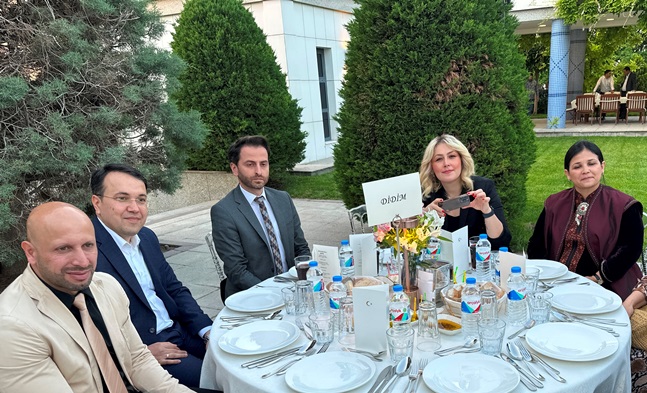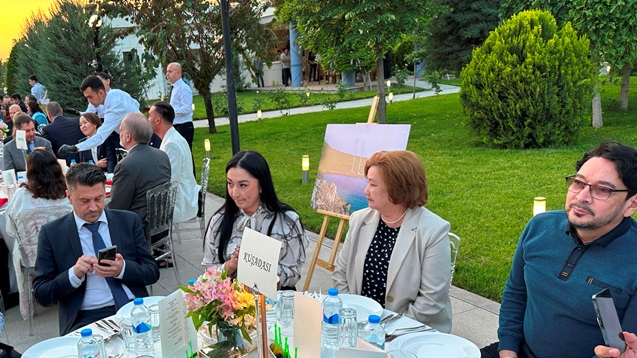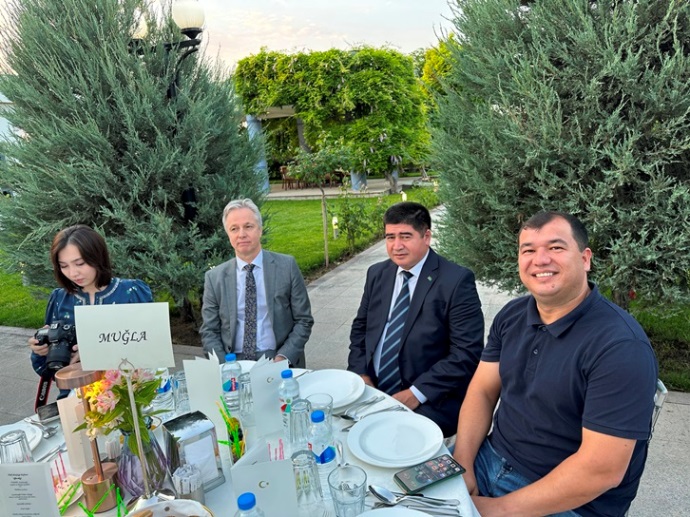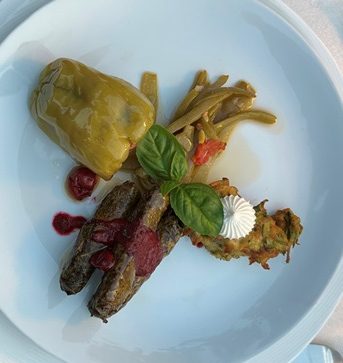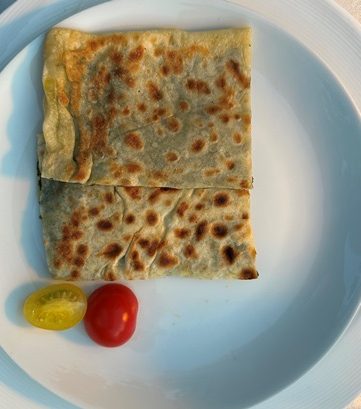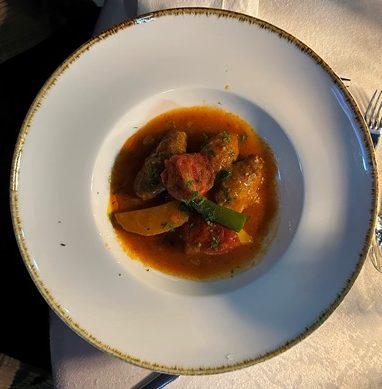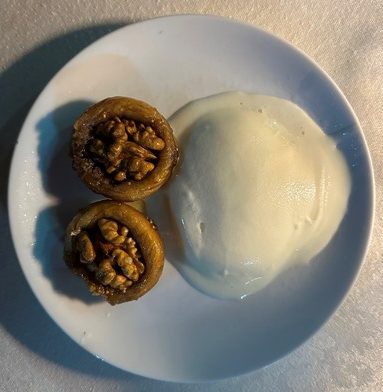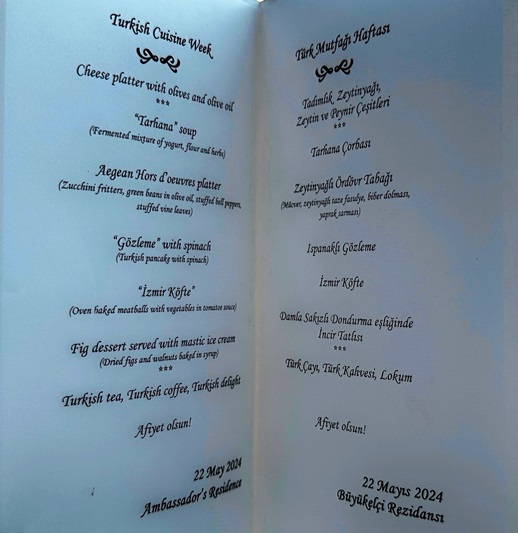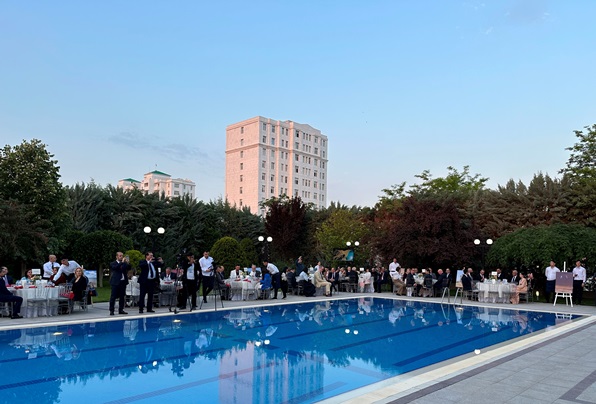As they say, the proof is in the pudding. This was literally the case Wednesday evening.
The Turkish Cuisine Week started with, of course, the Turkish Cuisine.
Ambassador Ahmet Demirok of Türkiye hosted a reception on 22 May 2024 in Ashgabat to mark the start of the Turkish Cuisine Week, 21-27 May 2024.
A reception, or a week, or a year of thirteen months, cannot fully encompass the Turkish cuisine. A compendium the size of the Encyclopedia Britannica would be required if we start writing all of the recipes from the Turkish kitchen.
There is a whole universe and it keeps expanding. There is endless variety of bread. There are mindboggling permutations and combinations of soups. There is an independent category of dumplings. The Turkish barbecue and grilled novelties don’t even recognize the sky as the limit. And let’s not get started about the sweets from a Turkish kitchen. There is, unquestionably, the cheese and olive platter on the table.
Ambassador Ahmet Demirok delivered a speech before the start of the meal:
Distinguished guests, I would like to welcome you to this special event that we organize within the framework of Turkish Cuisine Week.
Dear guests, In its third year Turkish Cuisine Week introduces Türkiye’s rich gastronomic culture to a broad audience across the globe. In this week, special events are being organized both in Türkiye and abroad by the Turkish diplomatic missions.
First Lady Emine Erdoğan, started this project to promote the richness of Turkish cuisine to a global audience and the gastronomy book called “Turkish Cuisine with Timeless Recipes” was published under her leadership.
This book draws attention to the famous Turkish cuisine and its waste-free, ecological and sustainable characteristics.
In addition to discussing the healthy storage and cooking techniques used in Turkish gastronomy, the book is intended to record centuries-old traditional recipes in their original form, and make them accessible to future generations.
Inheriting an imperial heritage, Turkish Cuisine embraces countless dishes from a vast territory stretching from Caucasus to Balkans, Middle East to Aegean, Black Sea to Mediterranean; blending them with her own culture and taste into unique recipes.
Turkish Cuisine is ancient yet timeless. It is shaped by countless civilizations such as the Seljuks and the Ottomans. It is among the richest cuisines in the world, featuring traditional recipes, prepared with local products in almost every region of the country.
Turkish cuisine supports healthy and balanced nutrition through its rich biodiversity, high-quality natural products and different storage and cooking techniques.
Turkish food, which draws on a wide variety of field-to-table vegetables and fruits, has numerous vegetarian and vegan nutrition options.
Turkish cuisine is naturally waste-free. Every component of each product is used and not wasted.
The transformation of potential food waste into edible delicacies such as vinegar and pickles reveal a gastronomic tradition that preserves biodiversity and is ecologically sustainable.
Turkish cuisine also stands out due to its cultural sustainability.
It features dining and drinking rituals formed around feelings of unity and solidarity.
Tables, where the entire family gathers and guests are accepted as guests of God, bring together people of all ages, conditions and social classes, playing an essential role in social cohesion.
Traditional tables are one manifestation of the generosity of the Turkish people and their love of sharing and solidarity.
Dear guests, Today we would like to introduce you the Aegean cuisine.
Let me briefly tell you about Aegean coast of Türkiye, namely “Turkaegean”.
The western coast of Türkiye stretching from Northern Aegean to Dalaman, is home to amazing landscapes, immaculate beaches, many UNESCO sites, hiking routes and beautiful villages.
It is known for its centuries-old olive trees and olive oils, the secret of a long life. In this region olive gardens stretch like a route from Çanakkale to Muğla, revealing the region’s cultural heritage that expands with olives and olive cultivation.
In the region, İzmir and Milas stand out as the two stops of the “The Routes of the Olive Tree”, which is registered by the Council of Europe.
The findings in the ancient Klazomenai in Urla, home to the Anatolia’s oldest olive oil workshop, attest to the 2,600-year-old history of olive processing methods that are still used today.
I strongly recommend that you take a tour on the “Turkaegean”, if you haven’t done yet and you will come across many hidden gems such as untouched coves where the water is crystal clear.
The region offers many exciting experiences such as cycling, windsurfing, hiking, diving, wellness, blue voyage, thermal springs, not to mention, gastronomy.
Whether luxury fine dining or a no-frills experience in a seaside village, the Turkaegean has it all.
The Aegean region of Türkiye is an extraordinary destination celebrating the good life with delicious olive oil and surrounding vineyards. Nature paves the way for sophisticated tastes.
Aegean cuisine is renowned for light and healthy dishes prepared with herbs, vegetables, fish, seafood and locally produced olive oil.
As a matter of fact, it is a fascinating example of Mediterranean diet which was accepted as intangible cultural heritage of humanity by UNESCO in 2010.
It is ecological for it involves many vegan and vegetarian options. It is sustainable for it is waste free and ingredients are locally produced.
In recent years, restaurants opened in the region centre innovative chefs who create culinary miracles while bringing products grown in nearby fields directly to the tables with sustainable production methods.
There are Green Star restaurants of the Michelin Guide, which recognizes restaurants that are leading the way in sustainable gastronomy.
Today we will offer you some delicacies of the region to your taste.
The Aegean menu presented at international events within the scope of Turkish Cuisine Week consists of recipes symbolising the abundance of the region, where the healthy, sustainable and Mediterranean-style diet has long been emphasized.
Aegean olives and cheeses, tarhana soup, mücver, Aegean style hors d’oeuvres platter, gözleme with spinach, İzmir-style meatballs and fig dessert with mastic ice cream are among the options on the menu.
Before concluding my remarks, I would like to extend our special thanks to “MADO” for their generous sponsorship and for supporting us in the preparation of this exquisite selection of Turkaegean flavors.
Last but not least, I also would like to thank our staff for their hard work and devotion to this special event take place.
As I said, in the Turkish culture guests are accepted as guests of God, you are the very much precious guest of the God today, and you are most welcome.
Afiyet olsun. ///nCa, 23 May 2024
Here are some pictures from the evening:
